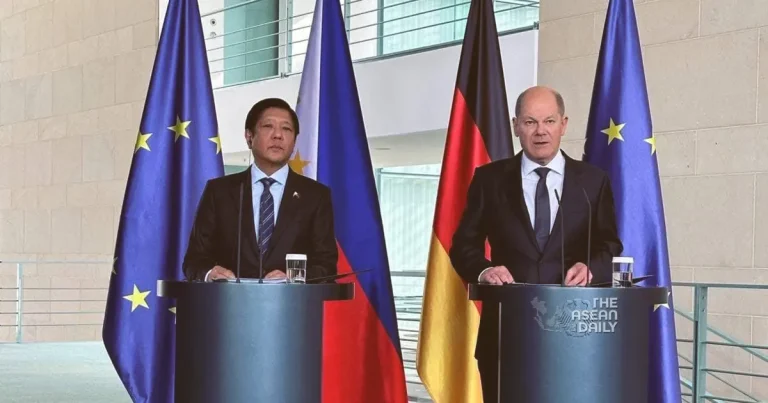13-3-2024 (MANILA) German Chancellor Olaf Scholz welcomed Philippine President Ferdinand “Bongbong” Marcos Junior to Berlin on Tuesday (March 12), following discussions with Malaysian Prime Minister Anwar Ibrahim the previous day. The visit marked a pivotal moment in the strengthening of ties between Germany and Southeast Asian nations.
During their meeting, Chancellor Scholz and President Marcos Jr. deliberated on the augmentation of military cooperation between Berlin and Manila. President Marcos Jr. highlighted the potential for enhanced collaboration in training the Philippine armed forces, bolstering defenses against cyber threats, and fortifying coastal protection measures. Notably, Germany has been actively engaged in training Filipino soldiers since 1974, signifying a longstanding partnership in the realm of defense.
While specific details regarding joint arms projects were not disclosed by President Marcos Jr., it’s evident that the Philippines, along with other Southeast Asian nations, is seeking to bolster its military capabilities, particularly in maritime security, amidst ongoing disputes with China over territorial claims in the South China Sea.
Furthermore, discussions between the two leaders extended beyond military cooperation, encompassing areas such as the development of natural resources, climate action, and labour migration. The significant presence of skilled Filipino workers in Germany, particularly in the healthcare sector, underscores the importance of fostering closer ties in the skilled labour domain.
Chancellor Scholz affirmed the commitment to a comprehensive expansion of cooperation in the skilled sector, with plans underway to formalize agreements to this effect. Moreover, emphasising the strategic importance of the Indo-Pacific region, Scholz articulated Germany’s intention to deepen political and economic engagement in the region, aligning with the European Union’s broader objectives.
In addition to addressing regional dynamics, discussions between Chancellor Scholz and President Marcos Jr. also touched upon the Israeli-Palestinian conflict, and the ongoing tensions between Israel and Hamas in the Gaza Strip.
The series of diplomatic engagements underscore Germany’s strategic pivot towards diversifying economic partnerships in Asia, reducing dependency on China. As Chancellor Scholz prepares to meet with Thai Prime Minister Srettha Thavisin on Wednesday, the trajectory of Germany’s foreign policy signals a proactive approach towards fostering stronger ties with Southeast Asian nations.




